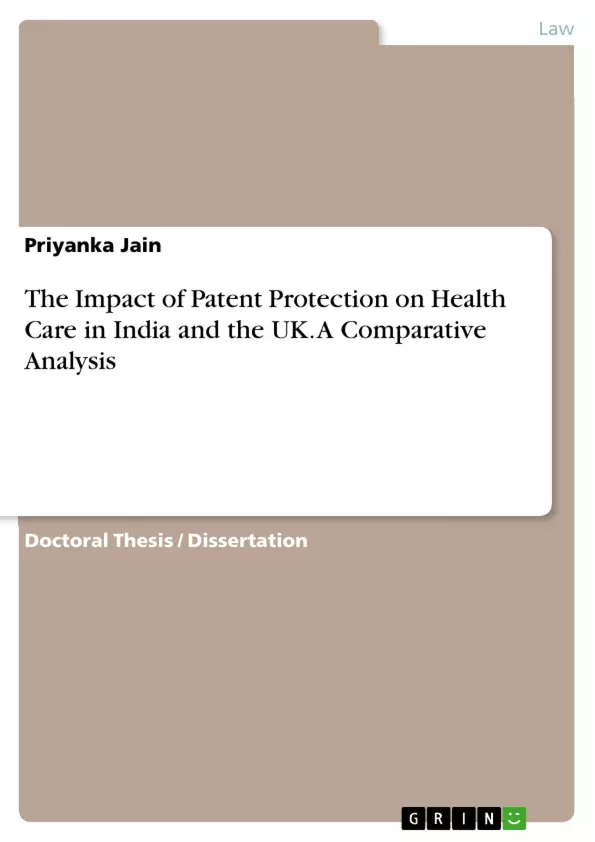This research undertakes a review of available studies to conduct a critical analysis of the impact of patent protection in developing health care innovations and further on public health in India and the UK.
A patent is an intellectual property right that is granted to an inventor of a product, to exclude others from manufacturing, selling, importing an invention without the permission of the inventor. It is a social contract whereby the patentee is granted a monopoly over their invention, and in return society receives innovation. Therefore, it is an incentive scheme to benefit inventors and society as a whole. There are several laws which regulate Patents, such as patent protection, increasing the life of a patent, reducing patentability standards and extending patent protection to undesirable products increase monopolies. The patent owners gain exclusive rights in the form of patents or an exclusive license, thus leading to an increase in the cost of such products. In addition, the patent owners adopt strategies to extend the scope of patent gain additional patents which protect the underlying ingredient of the medicine. Many pharmaceutical products are protected by Patents. The generic drug manufacturers in the pharmaceutical industry are affected such laws, which in turn affects the price of medicines available to patients. This creates a problem of access to affordable means of healthcare and further affects public health.
Finally, the research will provide recommendations such as a framework of price control model to ensure sufficient access to medicines, and other recommendation for future of the progressing patent system of both the countries.
Inhaltsverzeichnis (Table of Contents)
- INTRODUCTION: PATENTS AND HEALTH CARE
- CHAPTER I: PATENT LAW IN INDIA AND UK
- CHAPTER II: IMPLEMENTATION OF TRIPS FLEXIBILITIES
- CHAPTER III: FRAMEWORKS FOR BALANCING RIGHTS TO ACCESS TO MEDICINES AND INTERESTS OF PHARMACEUTICAL COMPANIES
- RECOMMENDATIONS
- CONCLUSION: SAVING NATIONAL INTEREST?
Zielsetzung und Themenschwerpunkte (Objectives and Key Themes)
This paper provides a comparative analysis of the impact of patent protection on healthcare in India and the UK, focusing on how patent laws influence access to affordable medicines. It aims to understand the implications of TRIPS flexibilities and their implementation in these two countries, considering the balance between incentivizing innovation and ensuring public health.
- Impact of patent protection on healthcare innovation and public health
- Implementation of TRIPS flexibilities in India and the UK
- Balancing access to affordable medicines with the interests of pharmaceutical companies
- Comparative analysis of patent laws in India and the UK
- Role of national health services in access to medicines
Zusammenfassung der Kapitel (Chapter Summaries)
- Chapter I: Patent Law in India and UK: This chapter explores the legal frameworks for patent protection in India and the UK, examining the relevant patent acts and their historical development. It analyzes the strengths and weaknesses of each country's approach to patent law, focusing on the principles underlying patent protection and their impact on innovation and healthcare.
- Chapter II: Implementation of TRIPS Flexibilities: This chapter examines how both countries implement flexibilities within the TRIPS agreement, specifically in the context of patent protection. It discusses the strategies employed by India and the UK to balance their obligations under the agreement with their national interests, focusing on the specific measures adopted to ensure access to affordable medicines.
- Chapter III: Frameworks for Balancing Rights to Access to Medicines and Interests of Pharmaceutical Companies: This chapter delves into the frameworks established in India and the UK to balance the rights of patients to access affordable medicines with the interests of pharmaceutical companies in protecting their intellectual property. It examines the different approaches adopted by the two countries in addressing this complex issue, highlighting the challenges and potential solutions.
Schlüsselwörter (Keywords)
This research focuses on the impact of patent protection on healthcare in India and the UK, examining the role of TRIPS flexibilities, access to affordable medicines, intellectual property rights, pharmaceutical industry, national health services, and comparative analysis of patent laws. It explores the complexities of balancing innovation with public health concerns in the context of developing and developed economies.
Frequently Asked Questions
What is the main objective of this comparative study?
The study analyzes the impact of patent protection on healthcare and access to medicines in India and the UK.
What are TRIPS flexibilities?
TRIPS flexibilities are legal provisions that allow countries to balance intellectual property rights with public health needs, such as compulsory licensing.
How do patents affect the cost of medicines?
Patents grant temporary monopolies to inventors, which can lead to higher prices by excluding generic competition.
What is the role of generic drug manufacturers mentioned in the research?
Generic manufacturers are crucial for providing affordable healthcare, but their operations are often restricted by strict patent laws.
Does the UK and India follow the same patent legal framework?
While both are influenced by international agreements like TRIPS, they have different historical developments and national implementation strategies.
- Citar trabajo
- Priyanka Jain (Autor), 2017, The Impact of Patent Protection on Health Care in India and the UK. A Comparative Analysis, Múnich, GRIN Verlag, https://www.grin.com/document/512487



